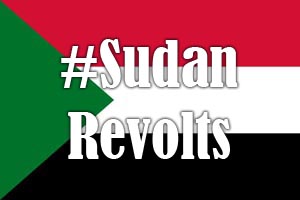 Must-read articles and tweets on #SudanRevolts:
Must-read articles and tweets on #SudanRevolts:
Will Sudan’s Bashir step down? by Abdul Rahman Rashid
Ignoring the fact that in terms of land area, Sudan was the biggest of the Arab countries, he sold one-third of Sudan to enable the establishment of the Republic of South Sudan so as to stay in power in return. Giving up all of Sudan’s oil, Omar Bashir became the first-ever leader in the history of mankind to donate his country’s resources with unmatched generosity. President Bashir gave up all his country’s petroleum without asking or apologizing to the thousands of his people who died for the sake of the country’s unity.
There was a time when he had announced that he would not give up even an inch of the land and sacrificed the lives of young Sudanese in a war in the south that continued for a decade and a half. Eventually he relinquished 600,000 sq.km, approximately the size of France. We must keep in mind that he came to power through a coup, in collaboration with Hassan Al-Turabi in 1989, under the name of Islam. Since that day, Bashir has done everything possible to remain in power. During his reign, he managed to turn Sudan from a green and oil-rich country to one of the poorest countries in the world. Most of the country’s professionals have fled abroad to search for a better living. His military forces have committed massacres in Darfur and perpetrated crimes that were no less heinous than the crimes of Assad in Syria. The only difference was there were no cameras and media to report the bloody horrors…
Sudanese president denies his government’s involvement in killing of protesters – SudanTribune
In his first appearance since the outbreak of the recent protests, the Sudanese president Omer Hassan Al-Bashir, accused unnamed parties seeking to destabilize Sudan of exploiting the events for killings, looting and vandalism. Last week, violent clashes erupted between the demonstrators and security forces in different parts of the Sudan following the government’s decision to remove fuel subsidies leading to at least 33 deaths according to official figures and more than a 150 according to activists and opposition. Sudanese authorities said they arrested 700 in connection with the riots and denied using live ammunition against protesters. They accused outside elements of firing at the demonstrators. The demonstrations saw the participation of thousands of Sudanese who chanted slogans against the government of president Omer Hassan al-Bashir like “The people want the fall of the regime!” and “Freedom! Freedom!”. Bashir, who was addressing a graduation ceremony in the military academy on Tuesday, vehemently denied holding his government accountable for the killing of protestors and prayed for mercy for the victims, calling them “martyrs”…
Is the Arab Spring moving south? Violent anti-government protests hit Sudan – NBC News
The wave of civil wars, revolutionary demonstrations, protests and riots dubbed the “Arab Spring” that spread across North Africa and into the Middle East in 2011 may well be heading south into Sudan, experts and activists say. In recent weeks, thousands of protesters have taken to the streets in cities across the East African republic, including in the country’s capital Khartoum, for the most widespread public demonstrations since president Omar al-Bashir seized power in a bloodless military coup 24 years ago. Protests quickly escalated from demonstrations over a cut in fuel subsidies to wider dissent against the country’s leadership after security forces killed at least 50 people last week, according to the African Center for Justice and Peace Studies and human rights watchdog Amnesty International. Local sources put the death toll much higher, although Interior Minister Ibrahim Mahmoud Hamad said 34 people had died. “This is our Arab Spring, this is the African Spring,” Ahmad, an activist with the main demonstration movement Girifina — or “We’re Fed Up” — told NBC News…
Sudanese Protesting Fuel Hikes, Corruption – Moez Ali
After the removal of the subsidies the price of petrol shot up from 12 to 21 Sudanese Pounds per gallon. The Sudanese population took to the streets in protest in Khartoum, Medani, El Obeid and other cities. The police, the National Intelligence and Security Services (NISS) and other security forces moved in to clear the streets with brutality. The protesters last year wear bombarded with tear gas; this year the security apparatus weren’t so lenient. The protesters were shot at with live ammunition and chased down the side streets of neighborhoods by the police and NISS. As a result, 210 people died and over 1,000 are believed to be detained. These protests however saw very little media coverage, partly due to the government’s clamp down on media outlets, and the NISS’s control over the press. Following a report on Thursday’s protests, Al Arabiya’s Sudan correspondent was detained and questioned. Al Arabiya and Sky News Arabia offices were closed down by NISS, including three or four local Sudanese newspapers. Those documenting the protests are targeted by NISS agents and subjected to detention, if not torture…
Gathering is really disturbing NISS. Had argument w/us but we stood our ground & pushed back. They’re in shock. #Sudan #ابينا
— Yousif Elmahdi (@Usiful_ME) September 30, 2013









